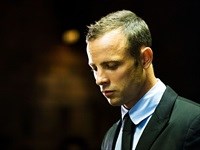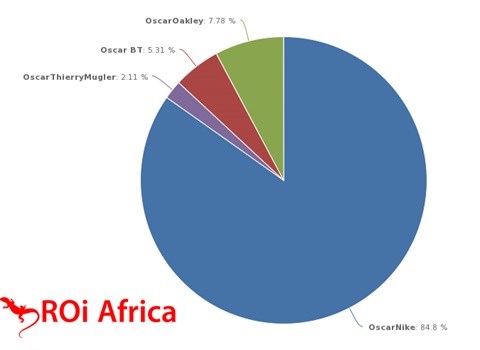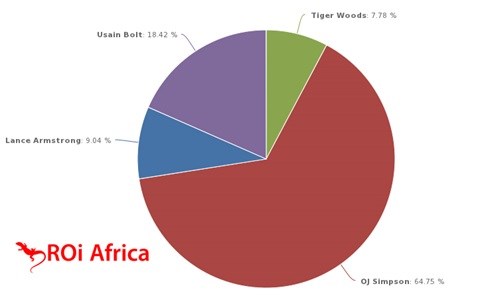
Top stories






More news

















Logistics & Transport
Uganda plans new rail link to Tanzania for mineral export boost









Besides Lance Armstrong, who is the one sporting brand that came crashing down during the last two years - from a R21m per year icon to a shamed brand liability? Oscar Pistorius!

This famous Paralympic athlete, who even competed successfully against able-bodied athletes and was seen as a role model for people facing severe challenges in life, was recently sentenced to five years in prison on a charge of culpable homicide for killing his girlfriend, model and law graduate Reeva Steenkamp.
His murder trial caused a media frenzy, in one hour alone (sentencing hour) ROi Africa saw over 110,000 unique items published in over 200 million platforms.
It was a landmark case in more than one way. A court application by media houses allowed for live coverage in the form of Tweets directly from the court room. On the top-yielding day of the trial, the verdict, over 400,000 unique items were reported mentioning the words "Oscar Pistorius" or "Oscar Trial".
Tonya Khoury, the Managing Director of ROi Africa was the first media intelligence provider to start delivering reliable statistical analysis of media coverage worldwide, becoming a regular face on Channel 199 and SABC Newsroom.
Mathapelo Matjokana, the producer of the Afternoon Talk with Ashraf Garda Show on SAFM, who was one of the first to use ROi Africa's statistics on a regular basis, says that, "With the arrival of these statistics and analysis people were able to understand, for example, the Oscar Trial better as complex legal matters were broken down into simpler terms. It also allowed us to follow major events like these through a bird's eye view with these analyses."
"The Oscar Pistorius brand - like any other business brand - had to cope with the effect of an incorrect decision and the aftermath thereof. In the media coverage of the trial, it was evident how the media's reporting affected Pistorius' brand value. One can, as an example look at his sponsorships that have declined to zero. Well-known brands like Nike, Oakley, Thierry Mugler and BT have suspended sponsoring Pistorius, Nike came under fire after a 2011 billboard campaign with the wording 'the bullet in the chamber" which proved to be almost prophetical. The brands were mentioned regularly during the trial and jokes featured on social media which also negatively impacted Nike, resulting in the suspension of large sponsorships for Pistorius" says Khoury.
When looking at all media (news and social) over the past 100 days and in all languages, these four brands received the following publicity, in relation to Oscar Pistorius.

As the former sponsor with the biggest percentage of media mention, Nike's coverage during the past 100 days can be broken down, the highest percentages of publicity was achieved on 14, 15 and 16 September, with all reporting on Nike dropping their sponsorship contract with Pistorius formally after he was found guilty by Judge Masipa and thus became a brand liability. These are insights that can be extremely valuable for any brand.
"With these mentions, sponsors like Nike have gained publicity, but for the wrong reasons, which made Pistorius a brand liability. His brand value thus impacted negatively on a few other brands," Khoury adds. According to media reports Oscar Pistorius was once the second most popular athlete, after Usain Bolt, but that is history now. During and after the case, he actually received more publicity compared to athletes that have experienced some kind of crisis in their careers," she adds.

As with any other brand, ROi Africa also looked at aspects like who and what were mentioned most with Pistorius, which is also an indication of his brand value. Smart Technology, managed by knowledgeable analysts enabled them to generate new angles and comparisons, like these, to keep the media and readers engaged.
"This technology, combined with personal input, identified key trends across all media platforms worldwide - over 2000 print titles that are taken from hard copy to digital format - and converted using the finest global reading technology. Broadcast media is converted from the verbal word to text within two seconds of it being aired. Immediate coverage is drawn from an excess of 200 million platforms in online and social media," explains Khoury. She adds, "Keeping track of what is being said about a company or brand, their industry of operations or specific topics of interest, and even their competitors can provide a much-needed competitive advantage," adds Khoury.
"Media intelligence on key competitors, main issues in the industry, top journalists reporting on your brand, top-yielding regions, comparative timelines and trends results in valuable instant insight. The successful use of media intelligence during crises depends on the severity of the crisis - in some cases most of the damage cannot be undone, but can be managed - as in the Oscar Pistorius Trial. But on the other hand one wonders what the influence of media coverage was on the eventual outcome of the case," she says.
"In the corporate world one would have a much better chance of using media intelligence information to minimise the onslaught of a crisis. In conclusion, what Google (as probably the most prominent search engine for online media) says about you has become an important part of brand value management in a digital age - and it is better to monitor and analyse media coverage in your brand than being surprised by an onslaught by a crisis."